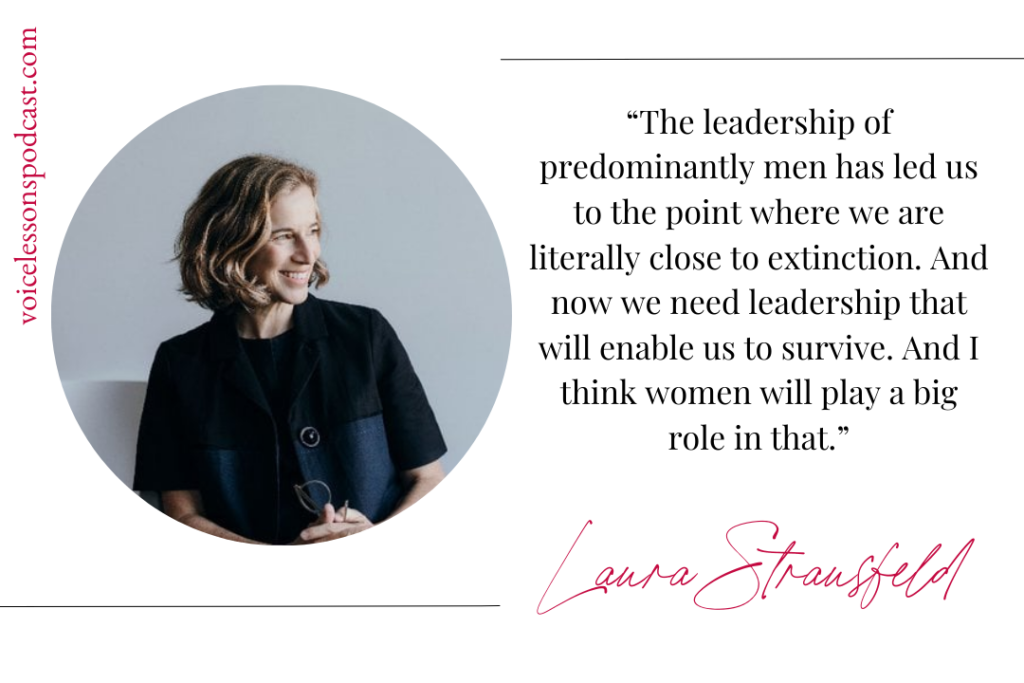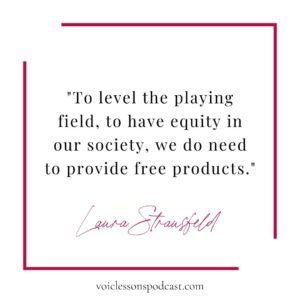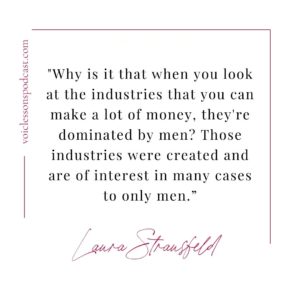https://directory.libsyn.com/episode/index/id/18751967
Together with 5 plaintiffs and the law firm Emery Celli Brinkerhoff, Laura Strausfeld and Jennifer Weiss-Wolf filed a class-action lawsuit against the state of New York for taxing tampons. Since 2016, their organization Period Equity has helped 20 states repeal the tax. In this episode, Laura talks about the winding creative road that lead her to this fight and asks women to join together and speak up about taboo subjects that women are uniquely poised to solve.
 Laura Strausfeld researched the illegality of the tampon tax years ago as a Columbia Law student. In 2016, upon reading an essay by Jennifer Weiss-Wolf in The New York Times, she reached out and proposed they mobilize legal action against New York State. Together with 5 plaintiffs and the law firm Emery Celli Brinkerhoff, they filed a class action lawsuit that resulted in immediate removal of the tax by the state. To continue their work together, they formed Period Equity.
Laura Strausfeld researched the illegality of the tampon tax years ago as a Columbia Law student. In 2016, upon reading an essay by Jennifer Weiss-Wolf in The New York Times, she reached out and proposed they mobilize legal action against New York State. Together with 5 plaintiffs and the law firm Emery Celli Brinkerhoff, they filed a class action lawsuit that resulted in immediate removal of the tax by the state. To continue their work together, they formed Period Equity.Laura’s co-founding of the first commercial all-natural perfume company in the 1990s gave her firsthand knowledge of the lax regulation of personal care products. She has done extensive research on environmental toxins and has written and spoken publicly about menstrual product safety.
Laura has a wide-ranging project-based background, including as a plaintiffs’ attorney, founding board member of the Nest Foundation, development strategist for the Economic Hardship Reporting Project, teacher, writer/director/producer of theater and film, and Anton Chekhov scholar at Columbia University’s Harriman Institute.
TOPICS DISCUSSED IN THIS EPISODE:
- How being a twin tied into Laura’s career steps and her mission to get women to collaborate.
- Laura’s non-toxic perfume business started as an accident and turned into a passion.
- What Laura learned about environmental risk in the perfume business and how these government regulations started her interest in manufacturing practices.
- Why creatives often become unexpected entrepreneurs and how they succeed.
- What is period equity and why does it matter?
- States collectively make over $150 million annually from taxing menstrual products.
- The tipping point that got the legislature to take action against the period tax in the NY state case in 2016.
- Women were excluded from medical research until the 1980s and early 1990s.
- We need to overcome being embarrassed about the issue of menstruation and use our voice to ask for necessities such as menstrual products.
- Scotland has made period products free.
- The goal of Period Equity and how women can get involved in their own communities.
- How litigation can alleviate menstrual inequality and fund free products for those in need.
- Whey menstrual companies aren’t doing their job when it comes to fighting for period equality.
- Why are most of the world’s billionaires male?
- Why feminine leadership often represents those who don’t have a voice.
RESOURCES/ADDITIONAL INFORMATION:
https://www.taxfreeperiod.com/- Explore the interactive map and learn if your state taxes tampons.
ACLU Menstrual Equality Toolkit
Menstrual Equity for all Act of 2019
#LESSONUP:
(4:40-6:09) I think the creative theme for me always involves collaboration starting with my twin. And so I had a partner, we started the first all-natural perfume company that was devoted to making perfumes as beautiful to put on your body as a good meal from natural ingredients. And we launched our line at Bergdorf Goodman. We sold it and Neiman Marcus and Saks Fifth Avenue. It was sort of an accidental digression in my life that became a passion because I started to be able to wear fragrance and then I was carrying them around and people wanted some, and then I started selling them and with a friend, we made it a business. I got worried when I wanted to have a child about the safety of even these very natural ingredients. That experience of reading up on safety issues and the complete lack of regulation, it was stunning to me that when we got our first big order from Bergdorf Goodman, at that time we didn’t have a production facility. So we made those in our kitchen and you could put anything in a bottle and sell it to people to put on their body and into the air and the government doesn’t care.
(8:30- 9:05) I was in law school in the early 1990s. I just moved to New York and apparently I’m the only person who looks at receipts, but I probably had exact change and I bought a box of tampons and chapstick. And I just noticed that I was paying tax on the tampons, but not the chapstick. I do recall asking the clerk what’s going on? And getting the response that the chapstick had a medical use, it was exempt from tax. So I went back up to the law library and looked up the law and realized this was an unconstitutional practice. I wrote up a memo. I tried for decades to get a law firm to help me file a case. What I did notice is that New York state had begun introducing legislation to remove the tax. And I was so naive about state law that I just assumed such an obvious injustice would be rectified. It was only when my daughter started menstruating that I was like, damn it, this really has to end.
(9:29- 10:10) Jennifer Weiss Wolf published a piece back in 2016 in the New York Times. And I realized that that the Times seemed right for people to understand and rally behind taking stronger measures to get rid of the tax. So I contacted Jennifer and I said, “I have a lawsuit.” And she said, “great.” And we worked with Emery Celli law firm in New York and filed a class-action lawsuit. And almost immediately, Governor Cuomo made a statement saying we should get rid of the tax. The assembly voted within 10 days to remove it. And then the Senate followed. It was a very quick response and it really seemed to tip the balance finally to get the legislature to take action.
(10:36-11:04) This is a classification based on sex. So the state is targeting a bodily function associated with women for less favorable treatment because they’re not taxing medical necessities for men and the American Medical Association and everybody else knows that these are medical necessities. Because of that, this is an unconstitutional violation of the equal protection clause.
(16:00- 17:05) We are seeing government involvement on a level we have not seen. I think in our lifetimes where everybody is getting a free vaccine, we are able to send checks to people, we are able to infuse states with trillions of dollars, maybe in few states with billions of dollars. I don’t know the numbers, but this is such a drop in the bucket. And it’s so essential to creating what we call menstrual equity, where everybody has equal access to what’s available to us in society. To level the playing field, to have equity in our society, we do need to provide free products.
(20:42- 21:44) In terms of feminine leadership, I’ve always identified as a feminist. I feel that leadership that represents people who have not historically felt they have a voice is strong leadership and the leadership that I really support and I see more and more. So companies, industries, legislators, people who are female, who are people of color, who are not cis-gender white men are very powerful leaders right now.
(23:04-24:50) There are things that are unique to women. And I think what is interesting is that if we did not have so many of us using our voice, there would be no change. And I have been in rooms of, in production, all men, and I’m the only woman. And I realized that the ideas that they have aren’t meant to not be inclusive, that’s not what they’re trying to do. They’re simply speaking to their experience. So if we don’t have women and women of color or nonbinary people or intersex or trans people in the room, then we don’t have that experience and those ideas communicated. And I too have had very powerful allies. I think there’s a belief that maybe you have to be like a Michelle Obama, or you have to be somebody who’s going to be so visible to actually make a change. But studies show that change is less viral. It’s much slower and results from tiny choices made by many ordinary women. And I think that’s powerful. And I think if the nurturing of those silent voices tends to happen more between and among women.
(25:45-26:10) What I’ve been thinking about a lot lately is women and money. And talking about women in power. But the industries where there are opportunities to make a lot of money are dominated almost exclusively by men. What’s occupied me just recently is this question of why are the billionaires male? What about opportunities like Bitcoin? Even in my own life opportunities to make a lot of money, why was I not drawn to them in ways that males have been drawn?
PIN IT:


Comments +